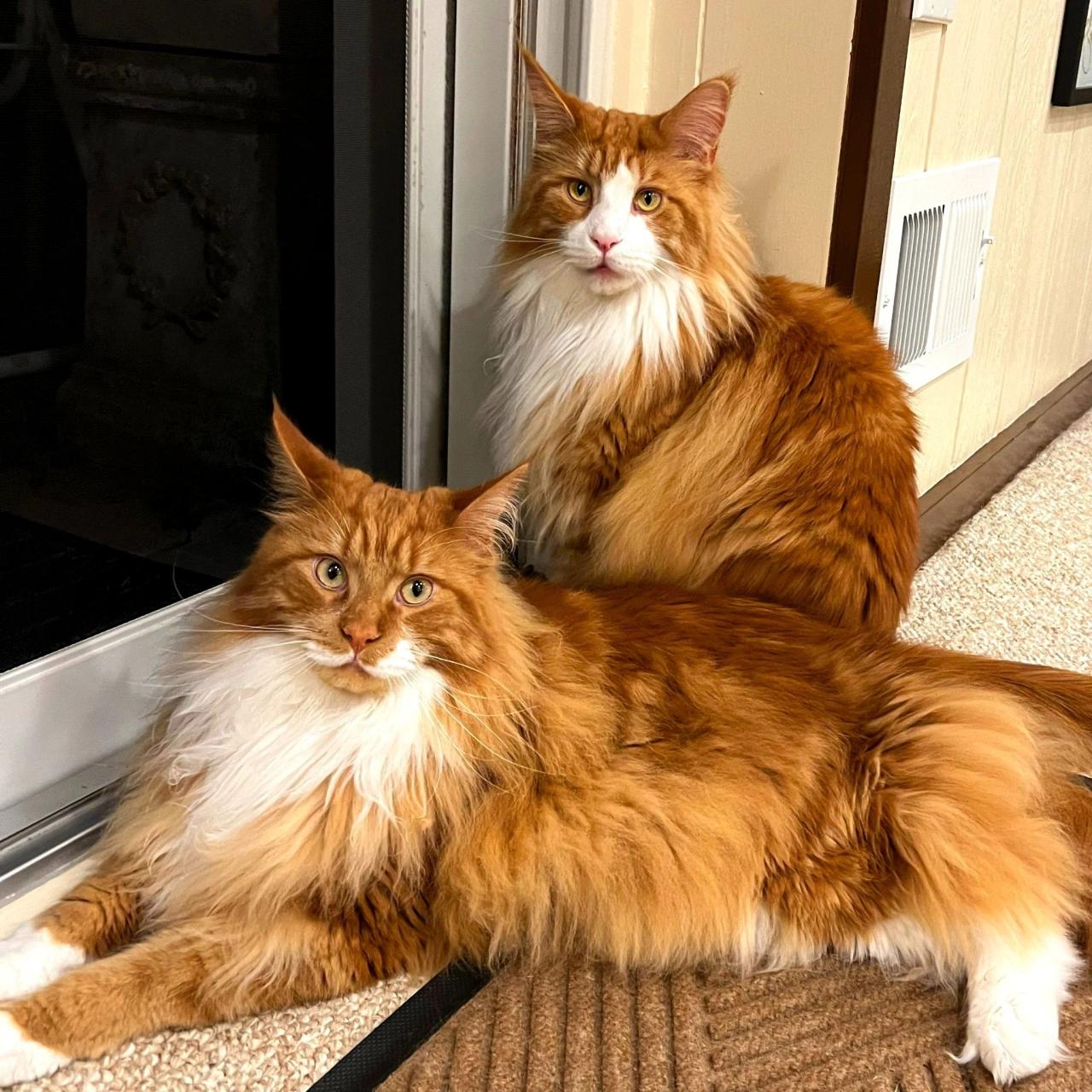Maine coon kittens vermont – In the heart of Vermont’s picturesque landscapes, Maine Coon kittens reign supreme as beloved companions, captivating hearts with their gentle nature and striking appearance. Their journey begins here, where we unravel the unique charm and irresistible allure of these extraordinary felines.
Maine Coon kittens are renowned for their distinctive physical attributes, boasting thick, flowing fur that cascades like a waterfall, expressive eyes that mirror the wisdom of ages, and a gentle demeanor that belies their playful spirit.
Maine Coon Kittens in Vermont: Maine Coon Kittens Vermont
Maine Coon kittens have gained immense popularity in Vermont, captivating the hearts of cat enthusiasts with their captivating appearance and endearing personalities. These gentle giants, known for their large size and distinctive physical traits, have become beloved companions in many Vermont households.
Maine Coon kittens are characterized by their robust bodies, thick, luxurious fur, and expressive eyes. Their distinctive coats, often adorned with a combination of brown tabby, black, and white, provide ample warmth during Vermont’s cold winters. Their large paws, resembling snowshoes, enable them to navigate snowy landscapes with ease.
Personality Traits
Beyond their striking appearance, Maine Coon kittens possess endearing personality traits that make them exceptional companions. They are known for their gentle and affectionate nature, forming strong bonds with their human families. Their playful and curious spirit brings joy and entertainment to their surroundings.
Maine Coon kittens are also highly intelligent and adaptable, quickly learning their surroundings and routines. Their loyalty and protective instincts make them not only beloved pets but also cherished members of Vermont households.
Anecdotes from Owners
One Vermont resident, Sarah, shared her experience with her Maine Coon kitten, Luna: “Luna is the most loving and playful kitten I’ve ever met. She loves to cuddle and purr, and she always greets me at the door when I come home from work.”
Another owner, John, described his Maine Coon kitten, Max, as “a gentle giant with a heart of gold. He’s always there for me, and he loves to play fetch with his favorite toy mouse.”
Breeder Directory
Finding a reputable Maine Coon breeder in Vermont can be a daunting task, but with our comprehensive directory, you can easily connect with experienced breeders who prioritize the health and well-being of their cats. Our list includes breeder contact information, website links, and up-to-date information on kitten availability.
Breeder Listings
| Breeder Name | Location | Website | Phone Number |
|---|---|---|---|
| Green Mountain Maine Coons | Burlington, VT | Website | (802) 555-1212 |
| Sugarbush Maine Coons | Warren, VT | Website | (802) 555-2323 |
| Catamount Maine Coons | Montpelier, VT | Website | (802) 555-3434 |
Kitten Care Guide
Maine Coon kittens are beautiful, intelligent, and affectionate creatures. They require special care to ensure they grow up to be healthy and happy cats. This guide will provide you with all the information you need to know about caring for your Maine Coon kitten.
Maine Coon kittens are known for their large size and long, thick fur. They are also very active and playful. As a result, they need a lot of exercise and attention. Providing your kitten with a stimulating environment is essential for their physical and mental well-being.
Feeding
Maine Coon kittens should be fed a high-quality kitten food that is specifically designed for their nutritional needs. Kittens should be fed three to four times a day, and the amount of food you give them will vary depending on their age and weight.
It is important to follow the feeding guidelines on the food label and adjust the amount you give them as they grow.
- Feed your kitten a high-quality kitten food that is specifically designed for their nutritional needs.
- Kittens should be fed three to four times a day.
- The amount of food you give your kitten will vary depending on their age and weight.
- Follow the feeding guidelines on the food label and adjust the amount you give them as they grow.
Grooming
Maine Coon kittens have long, thick fur that requires regular grooming. Brushing your kitten’s fur will help to remove dead hair and prevent mats from forming. You should also trim your kitten’s nails regularly.
- Brush your kitten’s fur regularly to remove dead hair and prevent mats from forming.
- Trim your kitten’s nails regularly.
Health Care
Maine Coon kittens are generally healthy cats, but they are susceptible to certain health problems, such as hypertrophic cardiomyopathy (HCM) and polycystic kidney disease (PKD). It is important to take your kitten to the vet for regular checkups to ensure they are healthy.
- Take your kitten to the vet for regular checkups.
- Maine Coon kittens are susceptible to certain health problems, such as hypertrophic cardiomyopathy (HCM) and polycystic kidney disease (PKD).
Kitten Adoption Process
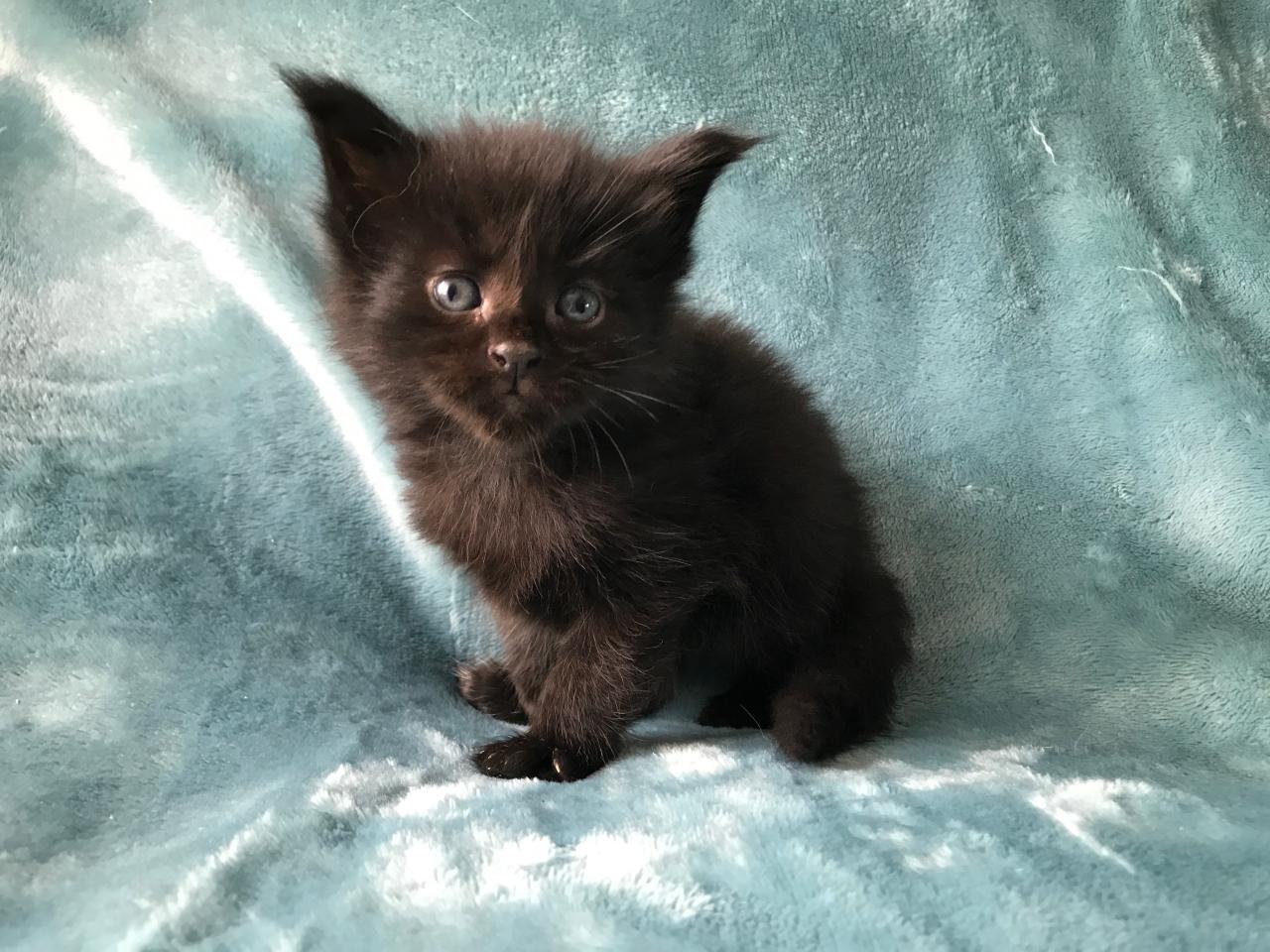
Adopting a Maine Coon kitten in Vermont involves several steps to ensure a smooth and responsible adoption process. These steps help breeders evaluate potential homes and ensure the kittens are placed in loving and suitable environments.
The process typically begins with an application, followed by a home visit and finally the adoption fee. Let’s explore each step in more detail.
Application Process
Interested individuals typically submit an application to the breeder, providing information about their living situation, family members, and experience with cats. The breeder reviews the application to assess the potential adopter’s suitability for a Maine Coon kitten.
Home Visits
Once the application is approved, the breeder may schedule a home visit to assess the living environment and meet the potential adopters in person. This visit allows the breeder to evaluate the home’s safety, cleanliness, and whether it provides an appropriate space for a Maine Coon kitten.
Adoption Fees
Adoption fees for Maine Coon kittens in Vermont vary depending on the breeder and the kitten’s age, lineage, and health status. The fees typically cover the costs associated with breeding, veterinary care, and socialization.
Success Stories
Many individuals have had positive experiences adopting Maine Coon kittens in Vermont. Here’s a heartwarming testimonial from one satisfied adopter:
“We adopted our Maine Coon kitten from a breeder in Vermont last year, and it has been an incredible journey. Our kitten is playful, affectionate, and has brought immense joy to our family. The breeder was knowledgeable and supportive throughout the adoption process, ensuring we were well-prepared to welcome our new furry friend.”
Kitten Health and Wellness
Maine Coon kittens are generally healthy and robust, but like all cats, they are susceptible to certain health issues. It’s crucial to provide regular veterinary care and follow recommended vaccination schedules to ensure their well-being.
Vaccinations are essential for protecting kittens from potentially life-threatening diseases such as feline distemper, feline calicivirus, and feline herpesvirus. The initial vaccination series typically begins around 8 weeks of age and is completed over several weeks.
Additionally, deworming and flea and tick control are important preventive measures against parasites that can cause health problems.
Common Health Issues
Some common health issues that Maine Coon kittens may encounter include:
- Hypertrophic cardiomyopathy (HCM):A condition in which the heart muscle thickens, leading to heart failure.
- Polycystic kidney disease (PKD):A genetic disorder that causes cysts to develop in the kidneys, leading to kidney failure.
- Hip dysplasia:A condition where the hip joint does not develop properly, causing pain and lameness.
- Dental disease:Maine Coons are prone to dental problems, including gingivitis and periodontitis.
- Ear infections:Due to their large ears, Maine Coons are susceptible to ear infections, especially if they have allergies.
Table: Health Issue, Symptoms, Treatment, and Prevention
| Health Issue | Symptoms | Treatment | Prevention |
|---|---|---|---|
| Hypertrophic cardiomyopathy (HCM) | Shortness of breath, lethargy, sudden death | Medication, surgery | Genetic testing, regular veterinary exams |
| Polycystic kidney disease (PKD) | Increased thirst, frequent urination, weight loss | No cure, supportive care | Genetic testing, early detection |
| Hip dysplasia | Lameness, difficulty walking, pain | Surgery, physical therapy | Proper diet, exercise, weight management |
| Dental disease | Bad breath, tartar buildup, loose teeth | Dental cleaning, extractions | Regular brushing, dental treats |
| Ear infections | Head shaking, scratching at ears, discharge | Ear cleaning, antibiotics | Regular ear cleaning, avoid allergens |
Kitten Socialization
Socialization is crucial for Maine Coon kittens as it shapes their behavior and temperament as they grow into adulthood. A well-socialized kitten will be confident, friendly, and adaptable to various situations.
Start socializing your kitten as early as possible, ideally between 2 and 7 weeks of age. This is when they are most receptive to new experiences and will learn to interact with different people, animals, and environments.
Introducing Kittens to Other Pets
- Introduce kittens to other pets gradually, under supervision.
- Start with brief interactions, allowing the pets to sniff each other through a closed door or baby gate.
- Supervise their first face-to-face meetings and provide positive reinforcement, such as treats or praise.
Introducing Kittens to Children
- Teach children how to handle kittens gently and respectfully.
- Supervise interactions and encourage children to speak softly and avoid chasing or grabbing the kittens.
- Provide plenty of toys and activities for both children and kittens to enjoy together.
Introducing Kittens to Strangers
- Invite friends or family members over to meet your kitten.
- Let the kitten approach strangers at its own pace and reward it with treats or praise for being friendly.
- If the kitten is shy, give it a safe space to retreat to, such as a cat tree or under a bed.
Socialization Activities and Games
- Interactive play:Engage in games like fetch, hide-and-seek, or laser pointers to stimulate the kitten’s hunting instincts and build a bond.
- Catnip toys:Offer catnip toys in moderation to encourage playful and energetic behavior.
- Puzzle feeders:Provide puzzle feeders that dispense treats as a reward for solving puzzles, stimulating the kitten’s cognitive abilities.
- Kitten classes:Consider enrolling your kitten in kitten classes where they can interact with other kittens and learn basic obedience commands.
Kitten Training
Maine Coon kittens are intelligent and eager to please, making them receptive to training. Basic training techniques can help establish good habits and ensure a harmonious relationship with your furry companion.
Litter Box Training
Consistency and patience are key to litter box training. Choose a designated spot for the litter box, preferably in a quiet and easily accessible area. Introduce your kitten to the box by placing them inside it several times a day, especially after meals and naps.
- If your kitten uses the litter box, reward them with praise, treats, or playtime.
- If they have accidents, calmly clean them up and avoid punishing them, as this can create fear and resistance.
- Keep the litter box clean and fresh, as kittens prefer clean environments.
Scratching Post Use, Maine coon kittens vermont
Scratching is a natural behavior for cats, and providing them with an appropriate scratching surface can prevent damage to furniture. Introduce your kitten to a scratching post by rubbing catnip on it or placing it near their favorite sleeping spot.
- When your kitten scratches the post, reward them with praise or treats.
- If they scratch elsewhere, gently redirect them to the scratching post.
- Make sure the scratching post is sturdy and tall enough for your kitten to fully stretch.
Leash Walking
Leash walking can be a fun and enriching experience for both you and your kitten. Start by introducing the harness and leash gradually, allowing your kitten to get used to wearing them before going outside.
- Practice walking your kitten indoors on a short leash, gradually increasing the distance.
- Once they are comfortable indoors, take them outside to a safe and controlled area.
- Keep the leash short and avoid pulling on it, as this can make your kitten resistant to walking.
Kitten Enrichment
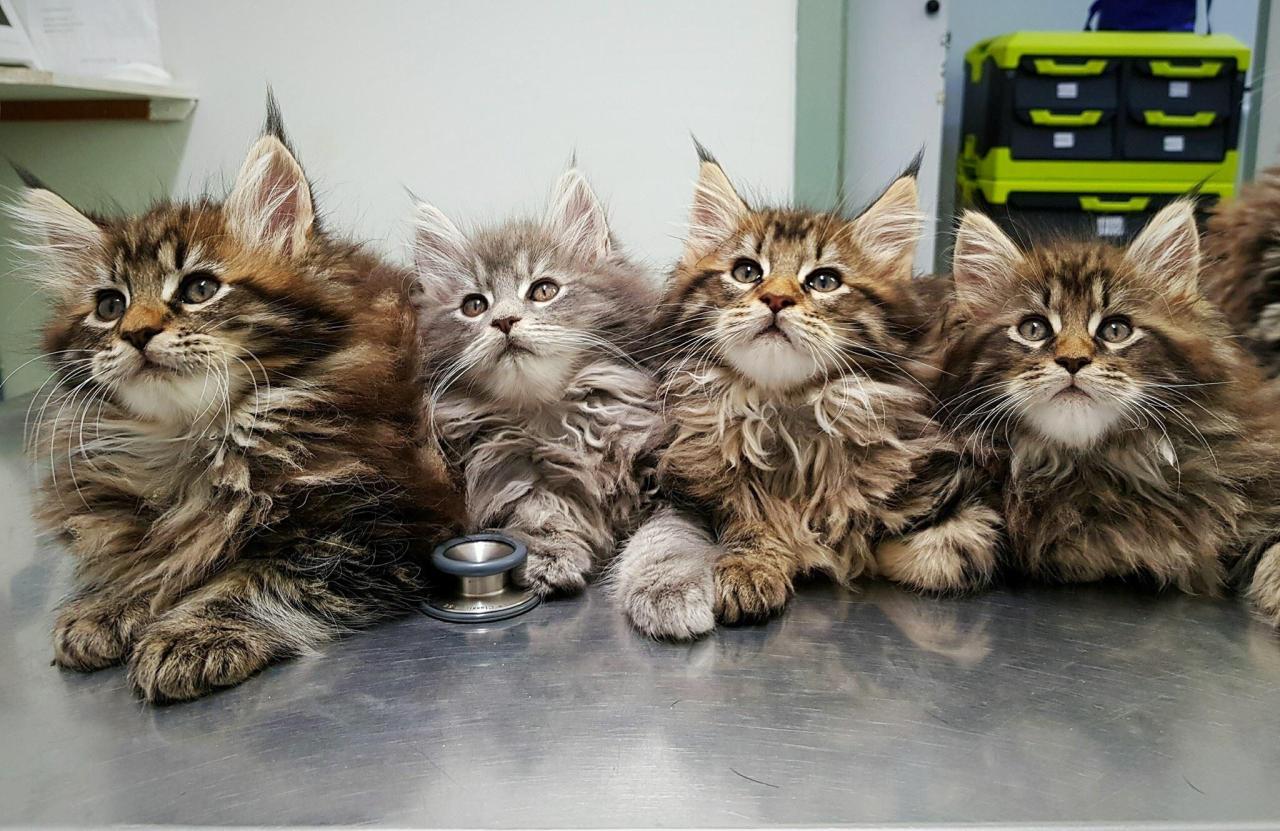
Maine Coon kittens are known for their intelligence and playful nature. Providing them with enrichment activities is essential for their physical and mental well-being. Enrichment activities provide opportunities for kittens to engage in natural behaviors, explore their environment, and develop their cognitive skills.
Play is an important part of a kitten’s development. It helps them learn social skills, develop coordination and motor skills, and release energy. Providing a variety of toys and interactive games can help keep kittens entertained and engaged.
Interactive Toys
Interactive toys allow kittens to engage with their environment and learn new things. Some examples of interactive toys include:
- Feather wands: Kittens love to chase and pounce on feather wands, which mimic the movement of prey.
- Laser pointers: Laser pointers can provide a fun way for kittens to chase and stalk a moving target.
- Interactive puzzles: Puzzle toys require kittens to use their problem-solving skills to access treats or toys.
Mental Stimulation
Mental stimulation is also important for Maine Coon kittens. Providing them with opportunities to learn and explore helps keep their minds active and engaged.
- Cat trees: Cat trees provide kittens with a place to climb, explore, and perch, which can help stimulate their senses and provide them with a sense of security.
- Window perches: Window perches allow kittens to watch the world go by, which can provide them with mental stimulation and entertainment.
- Hide-and-seek games: Hide-and-seek games can help kittens develop their problem-solving skills and provide them with a sense of accomplishment.
Environmental Enrichment
Environmental enrichment is important for providing kittens with a stimulating and engaging environment. Some examples of environmental enrichment include:
- Catnip: Catnip can be a stimulating and playful treat for kittens.
- Scratching posts: Scratching posts provide kittens with a place to scratch and groom, which can help them relieve stress and maintain their爪子健康.
- Hiding places: Kittens need places to hide and feel safe. Providing them with boxes, tunnels, or other hiding places can help them feel secure and comfortable.
By providing Maine Coon kittens with a variety of enrichment activities, you can help them develop into healthy, happy, and well-rounded cats.
Kitten Grooming
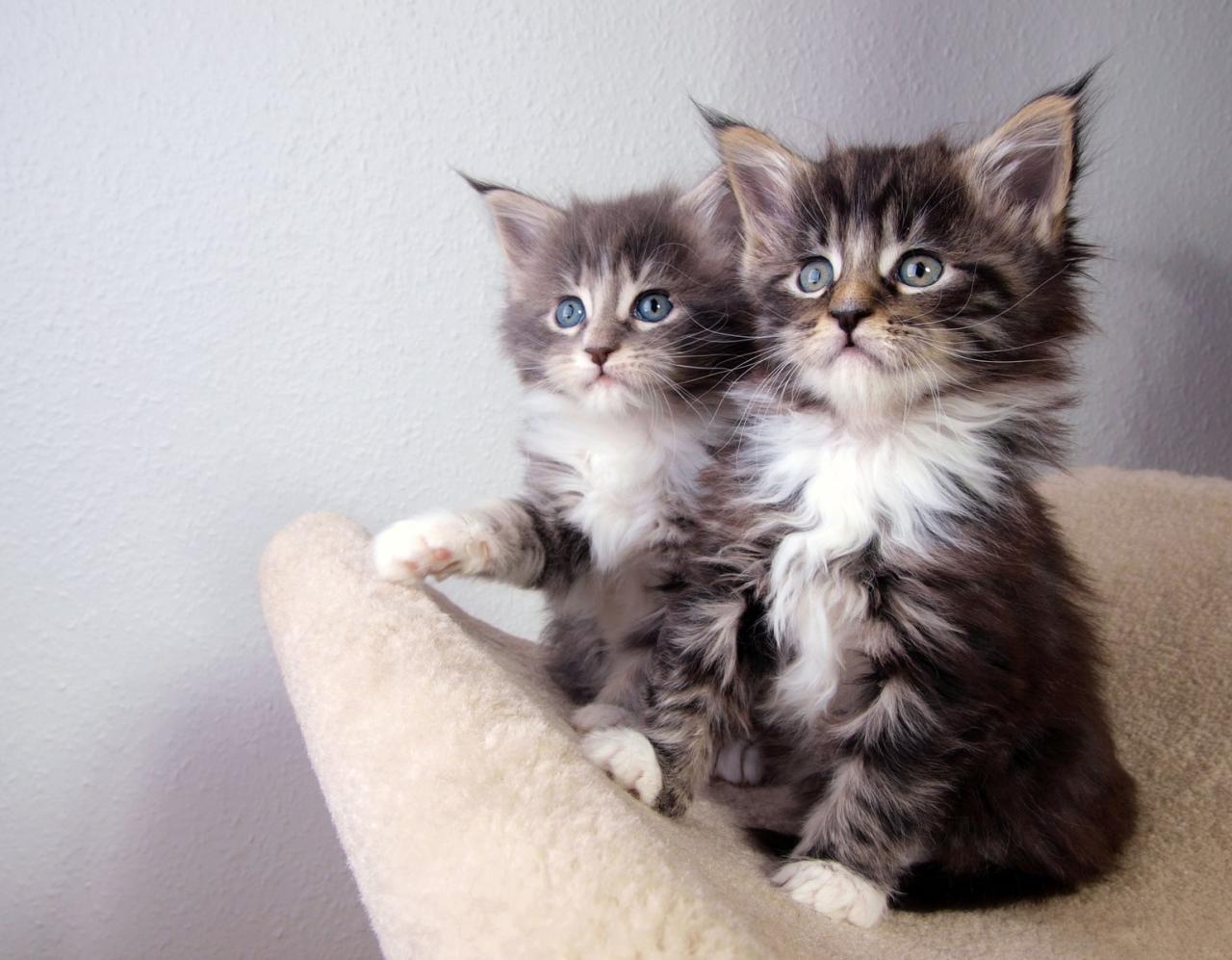
Maine Coon kittens require regular grooming to maintain their beautiful, healthy coats. Their long, thick fur can easily become matted and tangled, so it’s important to brush them several times a week.
Bathing is not necessary very often, but it can be helpful to give your kitten a bath every few months to remove any dirt or debris that may have accumulated in their fur.
Nail trimming is also an important part of kitten grooming. Kittens’ nails grow quickly, and if they’re not trimmed regularly, they can become sharp and uncomfortable for your kitten.
Brushing
Brush your kitten’s fur several times a week with a soft-bristled brush. Start at the head and work your way down to the tail, brushing in the direction of hair growth. Be sure to brush all the way down to the skin to remove any mats or tangles.
Bathing
Bathing your kitten is not necessary very often, but it can be helpful to give them a bath every few months to remove any dirt or debris that may have accumulated in their fur.
- Fill a bathtub or sink with warm water and add a small amount of kitten shampoo.
- Wet your kitten’s fur thoroughly and then apply the shampoo, working it into a lather.
- Rinse your kitten’s fur thoroughly with warm water.
- Towel dry your kitten and then brush their fur to remove any mats or tangles.
Nail Trimming
Kittens’ nails grow quickly, and if they’re not trimmed regularly, they can become sharp and uncomfortable for your kitten.
- Use a pair of sharp nail clippers to trim your kitten’s nails.
- Hold your kitten’s paw and gently squeeze the toe to extend the nail.
- Clip the nail at a 45-degree angle, being careful not to cut into the quick.
- If you’re not comfortable trimming your kitten’s nails yourself, you can take them to a groomer or veterinarian to have them trimmed.
Kitten Nutrition
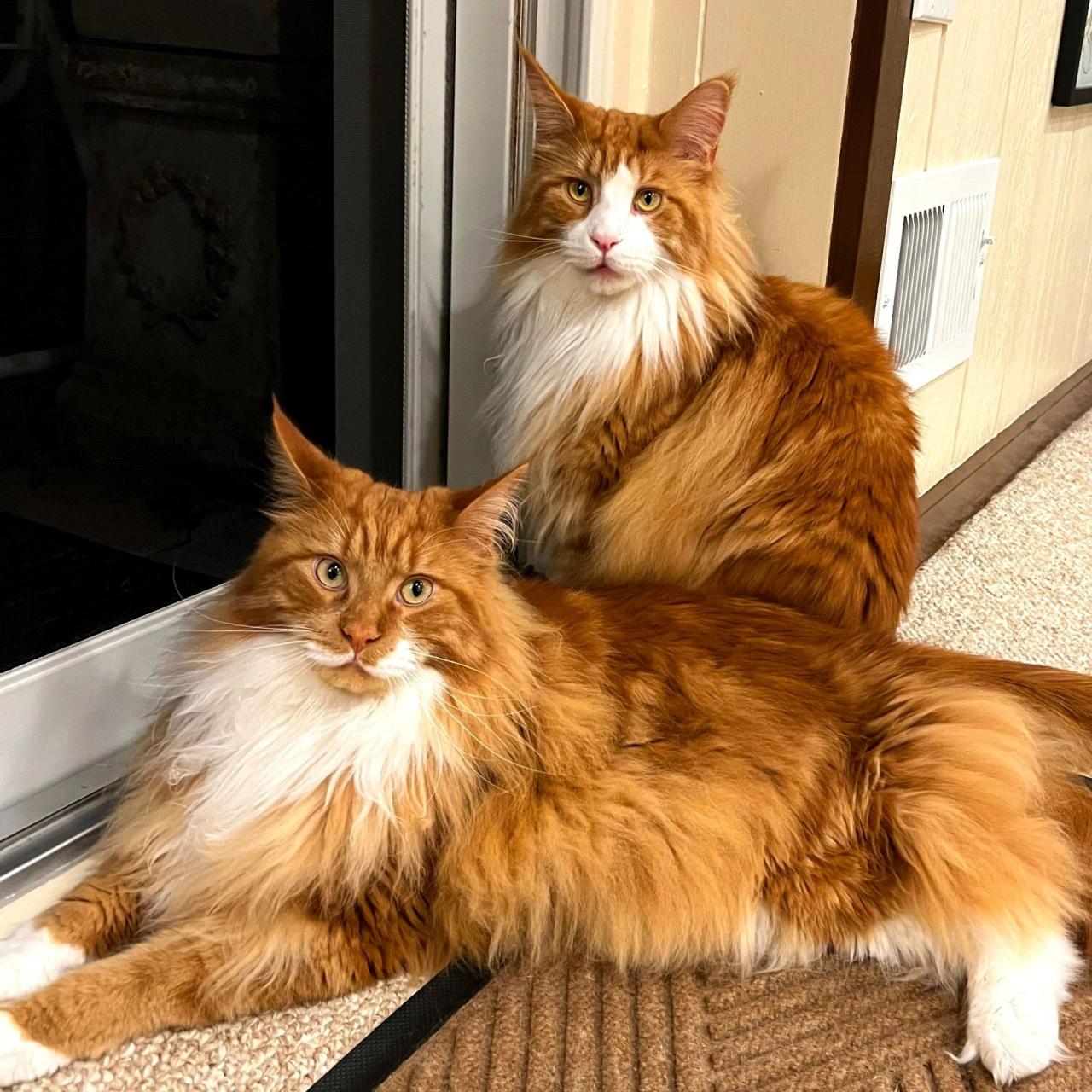
Maine Coon kittens require a specific diet to support their rapid growth and development. This guide provides detailed information on feeding your kitten, including nutritional requirements, portion sizes, feeding schedules, and tips for choosing high-quality kitten food.
Nutritional Requirements
Maine Coon kittens have high energy needs due to their large size and active nature. Their diet should be rich in protein, fat, and essential nutrients to support their growth and development. Look for kitten food that contains at least 30% protein and 10% fat.
Portion Sizes
The amount of food you feed your kitten will depend on its age, weight, and activity level. As a general rule, kittens should be fed 1/2 to 1 cup of food per day, divided into two or three meals. Adjust the portion size as needed to maintain a healthy weight.
Feeding Schedules
Kittens should be fed on a regular schedule to help them develop good eating habits. Feed your kitten at the same time each day, and allow them to eat for 15-20 minutes before removing the food bowl. This will help prevent overeating and obesity.
Choosing High-Quality Kitten Food
When choosing kitten food, look for brands that are specifically formulated for Maine Coon kittens. These foods will contain the right balance of nutrients to support their growth and development. Avoid foods that contain fillers, such as corn, wheat, or soy.
Common Feeding Mistakes
There are several common feeding mistakes that cat owners make. These include:* Overfeeding: Overfeeding can lead to obesity, which can cause a number of health problems.
Underfeeding
Underfeeding can lead to malnutrition, which can also cause health problems.
Feeding table scraps
Table scraps are often high in fat and calories, and can lead to weight gain and other health problems.
Feeding dry food only
Dry food can be high in carbohydrates, which can lead to weight gain and other health problems.
Final Wrap-Up
As we bid farewell to the enchanting world of Maine Coon kittens in Vermont, their legacy as cherished companions remains forever etched in our hearts. From their captivating appearance to their affectionate nature, these gentle giants have woven a tapestry of love and loyalty that will endure for generations to come.

